Frank Diver Natural born survivor It's a fact of
life.
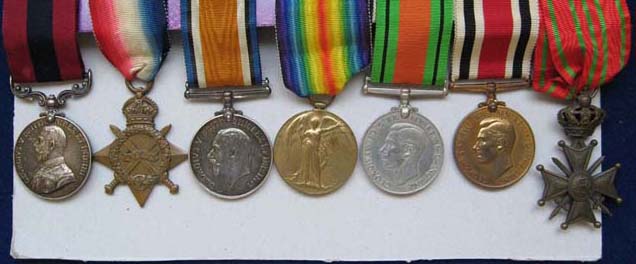
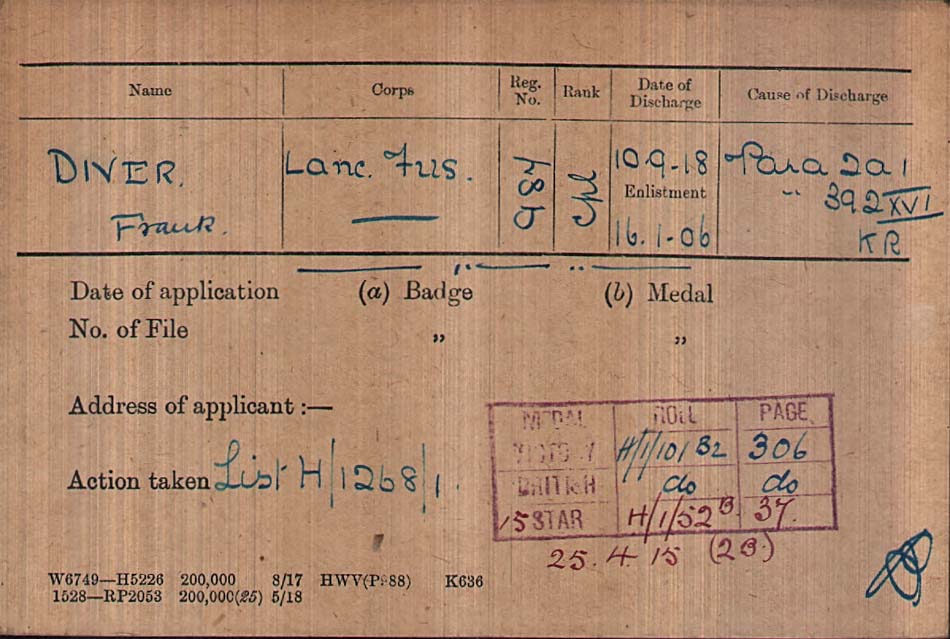
Some medal groups are different from the rest. They stand out. They
have some indefinable quality sparking a response from your collecting
instinct. Frank Diver's group belongs to this elite category.
His medals appeared in a Wellington Auctions catalogue in 2007. The
catalogue description had a compelling phrase. The group came "with
a significant quantity of original documentation." The original
documents would prove invaluable, since no soldier's papers or pension
records have survived in the National Archives.
The group comprises a D.C.M. [G.V.], 1914/15 Star Trio, Defence Medal,
Special Constabulary Long Service Medal [Coinage profile] and Belgian
Croix-de-Guerre. The D.C.M. is named to "987 Sergeant F. Diver
1st Lan. Fus." The trio are all named to "987 Corporal F.
Diver Lan. Fus." While the Special Constabulary Medal has "Frank
H. Diver."
The catalogue notes stated that Sergeant Diver took part in the Lancashire
Landings at Gallipoli in 1915 and the First Day of the Somme on 1st
July 1916, before being wounded at Cambrai in 1917. This would mean
he also survived the Passchendaele offensive prior to Cambrai. His documentation
proved this assumption. Because Frank Diver spent his entire army career
with the 1st Battalion and remarkably with the same Company.
I first came across his name when reading a popular history of the Regiment
written in the early sixties. What made the writer pick out Diver's
name for inclusion in the 1st World War chapter? After all he had a
host of similar gallantry stories to choose from. The answer is as follows.
On the 10th October 1917 in the middle of the battle of Poelcappelle,
a remarkable incident occurred. Lieutenant Le Mesurier of "C"
Company, 1st Battalion Lancashire Fusiliers, led four men back to Elverdinghe
camp. The rest of the Battalion had left the front line the previous
day, having battled shell-fire, German counter-attacks and the Flanders
mud. Half the Regiment were casualties. Le Mesurier was the only surviving
Officer left in "C" Company. He established himself in "Senegal
Farm" an enemy Pill-Box, then beat off repeated German attacks
all the long bloody day. When the Battalion had retired, Le Mesurier
and his command may have been given up for lost. So when news of their
survival came through, the entire camp turned out to greet them with
thunderous cheers.
The 29th Division Commander Major-General Sir H.de B. de Lisle said,
"Whatever honour Lieutenant Le Mesurier may gain in life, none
can equal the spontaneous approbation of their comrades in the ranks
so freely offered to himself and his four men." Sergeant Frank
Diver was one of these four men. He was awarded a richly deserved Distinguished
Conduct Medal and Belgian Croix-de -Guerre for his gallantry. Yet for
all that, he must have treasured the memory of that morning, as one
of the proudest moments in his life.
Frank Diver was born in November 1888 in the village of Landbeach, north
of Cambridge. Curiously he was baptised Frank Harold, while the civil
registration has him as Frank Earl. His Father was an agricultural labourer
and Sexton to All Saint's Church Landbeach.
Frank was the youngest child of six. The 1891 Census shows the Diver's
living at 75 High Street, Landbeach.
In 1895 when Frank was seven, his Mother died. Three years later his
Father married again to a widow with three children. By 1901 Frank had
five younger siblings. He combined two jobs. That of Farm Servant and
News Deliverer. We know this because he managed to get himself recorded
on the Census twice! Once at his Father's House and then at his Grandmother's!
The twelve year old Frank must have thought it a grand joke!
It is not difficult to guess the reason why he enlisted into the
Army in January 1906. He was eighteen and must have felt like a spare
part at home. It is likely he was lodging with his married elder sister,
since he names her as one of his next of kin. His Soldier's Small Book
fortunately survives to provide these essential details. We learn that
he was 5' 3" tall and enlisted at Cambridge for the Lancashire
Fusiliers on the 16th January 1906. I have often wondered why a Cambridgeshire
farm lad choose a north-western Regiment, in preference to his local
one. I can only surmise one of his boyhood mentors must have been an
old soldier of the 20th Foot.
So it was that young Diver with his country accent experienced the first
of many cultural shocks. He arrived at the Regimental Depot at Bury,
Lancashire and encountered the broad Lancashire dialect of the natives.
Bury with its mills and cobbled streets must have seemed a world away
from the Landbeach fields and hedgerows.
After basic training he started to see the world. His Soldier's Small
Book tells us that he was posted to "C" Company of the 1st
Battalion. He was to spend all his army service with "C" Company.
His Company Commander was the redoubtable Captain R. R. Willis, who
would win the Victoria Cross at the Gallipoli Landings on 25th April
1915.
Willis' initials appear every year in the above-mentioned book proving
Diver's membership of "C" Company. Diver's post war "Particulars
of Service" form survives. Reading between the lines this informs
us he was an intelligent young man, both eager and willing to better
himself. He earned his 3rd Class and 2nd Class Education Certificates
in 1906 and 1910 respectively. He became proficient in Stretcher Bearing,
Swimming and Ambulance Training. He also passed a class of Instruction
in Elementary Pushtu!
The pre-war Lancashire Fusiliers Annuals give copious information on
every Battalion's sporting prowess. After a careful study I can say
that Diver did not distinguish himself on the field of sport! I can
only find one mention of his name. It is however a significant one.
The 1911 Annual details the results of a rifle competition held at Meerut
in November of that year. "A number of keen shots" [from the
1st Battalion] "attended the meeting at their own expense."
Private Diver's name appears as a prize-winner. This shooting ability
would prove useful in the years to come.
The 1st Battalion produced a photograph Album in 1911, when they were
stationed at Multan, India. Frank Diver's "C" Company is of
course featured. What a pity we cannot identify him.
In April 1914 at Hyderabad, India, Corporal Diver was discharged after
nine years' service to the Army Reserve. Major Wade of the 1st Battalion
wrote him a glowing character reference. This still survives
Frank was not destined to get used to civilian life for long, since
the Great War erupted in August 1914. As a Reservist he was immediately
recalled to the Colours. He was appointed Lance Sergeant on 5th December
1914.
The 1st Battalion was recalled from India, They caused a sensation
when landing at Avonmouth on the 2nd January 1915, because they were
dressed in Red. They would be part of the soon to be famous 29th Division.
Frank quickly renewed his old friendships. Captain Willis still commanded
"C" Company. On the 12th March 1915 they were inspected by
H.M. King George V at Wolston near Rugby. On the 25th April 1915 they
would be assaulting the heavily defended "W" beach of Gallipoli.
Much has been written about the famous landing of the 1st Battalion.
The demands of space mean that only the briefest account can be made.
The Commander-in-Chief Sir Ian Hamilton in his official despatch wrote:
- "So strong were the defences, that the Turks may well have considered
them impregnable. It is my firm conviction that no finer feat of arms
has ever been achieved by the British soldier than the storming of these
trenches from open boats on the morning of the
25th April."
Captain Raymond Willis gives a graphic account.
"Not a sign of life was to be seen on the Peninsula. It might have
been a deserted land we were nearing in our little boats. Then rapid
fire, machine guns and accurate sniping opened from the cliffs above.
The casualties included our crew and many men. We were exposed and helpless
in our slow moving boats. Target practice for the Turks. Within a few
minutes only half of the thirty men in my boat were left alive. We were
100 yards from the shore and I gave the order "Overboard."
We scrambled out into four foot of water. No return fire was possible,
for the enemy was in trenches well above our heads."
The Fusiliers trudged onto the beach which had barbed wire, plus a concealed
trip wire and land mines. Machine-guns enfiladed the beach mowing men
down in batches, as they waited for the wire to be cut. Willis silenced
a sniper who had inflicted heavy damage. He pithily states. "I
closed his career with the first shot. Yet the heap of empty cartridges
around him testified to the damage he had done.
" From henceforth "W" Beach would be known as "Lancashire
Landing." The Battalion would be awarded six Victoria Crosses for
their astounding collective gallantry. Prompting the celebrated Regimental
slogan of later years - "Six V.C.'s before breakfast." One
of the V.C. winners was Captain Willis of "C" Company.
A famous illustration was later produced entitled "The Lancashire
Landing." A graphic picture showing Willis at the sea shore waving
his walking stick and encouraging his men.
Imperishable glory is always bought at a heavy price. The Regiment suffered
grievously. By the end of the day the Battalion strength had been reduced
to 11 Officers and 399 Other Ranks. A magnificent pre-war Battalion
would never be the same again.
This is not a history of the 1st Battalion in Gallipoli, but of one
man. Diver survived the resulting campaign. He would be wounded later
in the war, but not on the Gallipoli Peninsula. He survived the First,
Second and Third Battles of Krithia. Plus the costly action at Gully
Ravine on the 28th June 1915. By the 29th June the Commander of what
remained of the 1st Battalion was a Lieutenant.
By October 1915 so -called "open warfare" had degenerated
into stalemate. Life in the trenches with the interminable flies, lice
and dreary rations, generated an epidemic of septic sores and dysentery.
On the 15th November a violent storm hit the Peninsula. Several men
of the 1st Battalion were drowned in the unremitting deluge. November
also brought a snow blizzard. Men died from exhaustion and exposure.
On the 2nd January 1916 the 1st Battalion finally left Gallipoli. It
was said the best planned operation in the entire campaign, was not
the landings on Gallipoli, but the evacuation.
After some weeks in Egypt the 1st Battalion sailed for France in March
1916. Frank Diver's next encounter with total destruction would rank
as even worse than landing under fire at Gallipoli.
On the 1st July 1916 the Battle of the Somme began. Thirteen Divisions
of the British Army and five French Divisions attacked the well-dug
in German front line.
The events of the 1st July are by now famous, including the part played
by the 1st Battalion. If Diver had stretched his luck at Gallipoli he
would stretch it again almost to breaking point at the Somme.
The Battalion attacked in extended order at 7-30a.m. after a huge mine
had been exploded ten minutes earlier. Diver's Company was in the rear
of the attack. Each man carried engineer stores, two day's rations,
Mills Bombs as well as 120 rounds of ammunition. They were filmed at
6a.m. by Geoffrey Malins, the Official War Office cinematographer. Part
of his material was used in the film "The Battle of the Somme",
which was a nationwide hit back home. One of the famous stills shows
"Lancashire Fusiliers in a trench, fixing bayonets on 1st July
1916." C.S.M. Nelson has been identified. This gentleman belonged
to "C" Company. The C.S.M. as well as the Company Commander
were immediately hit as they stood up to give the order to advance.
A selection of poignant extracts from the Regimental History and the
autobiography of Fusilier George Ashurst, sum up the day, far better
than any words of mine.
"C Company was caught by Machine-Gun fire as it left the front
line."
"The remnants of "C" Company had to be reorganised for
a further advance." It is estimated that about sixty men from "C"
Company reached the temporary haven of a sunken road before the German
front-line.
"Men lay dying from terrible wounds. Others sat at the bottom of
the trench shaking and shouting, not wounded but unable to bear the
noise, the smell and the horrible sights."
"The whole of the [sunken] road was strewn with dead and dying
men…. talking deliriously, calling for help and asking for water."
The Battalion Colonel ordered a section of Stokes Mortar Crews in the
road to open rapid fire against the German lines. A forlorn hope of
seventy-five men attempted to advance under this covering fire. It was
a brave bloody failure.
"Hundreds of dead lay about and wounded men were trying to crawl
back to safety." German shells "dropped amongst these poor
fellows, blowing dead men into the air and putting others out of their
agony.
" By 11-45a.m. only one Officer and 75 men were available for an
attack. At 6pm the sunken road was finally evacuated.
Once again the 1st Battalion had suffered grievously. 7 Officers and
156 men had been killed. 14 Officers and 298 men had been wounded. This
from strength of 22 Officers and 675 men.
Once again the 1st Battalion had been to all intents and purposes destroyed.
It beggars belief that Frank Diver survived the horrific events of this
terrible day.
Yet somehow he did.
The Battle of the Somme was not of course just about the tragic events
of the 1st July. The remorseless battle ground on until mid-November
1916.
The third year of the "War to end all wars" would find the
1st Battalion engaged in the Passchendaele offensive. By now it was
a shadow of its pre-war self.
On the 9th October 1917 the 1st and the 2nd Battalions Lancashire Fusiliers
for the first time in their History fought side by side. The Official
History styles it as the battle for Poelcappelle. As far as Sergeant
Diver's "C" Company was concerned they were in the Second
wave. The Regimental History states "much rain had fallen during
the night and the ground was very wet." The nightmarish landscape
over which men would fight, die and drown must have been terrifying.
As "C" Company advanced they were decimated by enemy counter-attacks.
All the Officers were hit with the exception of Second-Lieutenant Le
Mesurier. He settled himself and his men in a German Pillbox,
which must have seemed a haven. Then immediately he had to protect his
flank. The Regimental narrative says. "In this regard he was ably
assisted by Sergeant Diver, who had also succeeded to the command of
his platoon, when the subaltern had become a casualty. He had been badly
shaken by the explosion of a shell, but had nevertheless continued to
lead his men forward."
It must have taken some nerve to leave the concrete pillbox and venture
out into that hellish landscape of shell-holes and liquid mud. Yet he
did so taking his men and establishing a firm line on the exposed flank.
This was not a moment too soon. For the Germans launched a massive counter-attack,
which reportedly was Battalion strength. The Regimental History states
this "half-hearted effort withered away under the rifle fire of
the now firmly established line." An astonishing sentence. Think
about it. A platoon of resolute men overcame what the Regimental History
says was "eight consecutive lines" of attack! Attacking across
the Passchendaele mud was just as hazardous for the Germans as it was
for the British. Again the advantage was with the defenders. It is also
worth noting a significant line from Diver's gallantry citation. A citation
obviously drafted by the gallant and generous Le Mesurier.
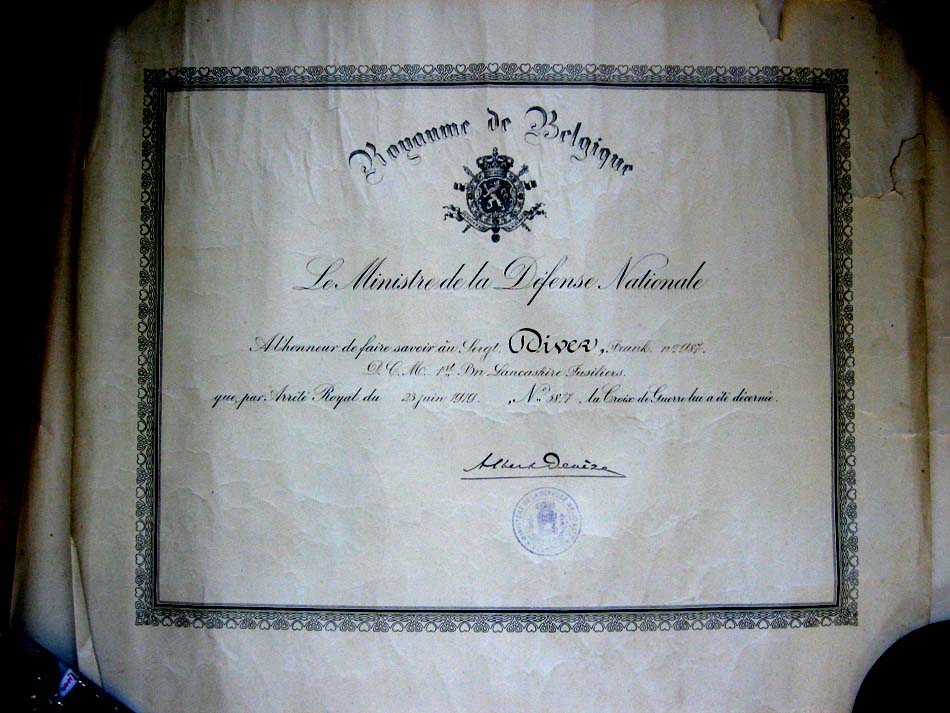
"It was mainly owing to his [Diver's] courage and determination,
that the position was made secure."
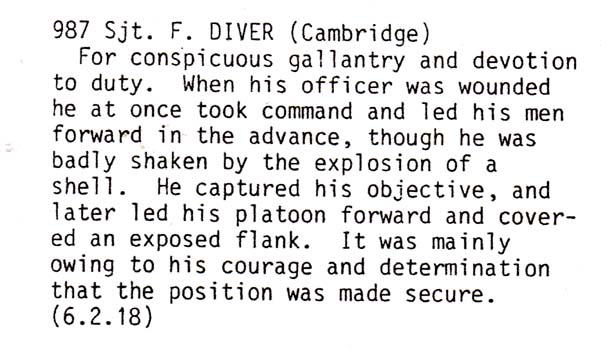
The Battalion was withdrawn later that night. As has been outlined earlier,
Le Mesurier and his flanking party could not leave for some time after.
Diver had survived a hellish night crouching in shell-holes and trenches
full of water. Then came a slow deadly trudge back to friendly lines.
Put a foot wrong and you could drown in moments. They were now reduced
to five in number. Somehow he had cheated death yet again.
However luck is finite. It has its limits. The strain inevitably tells.
Sergeant Diver's Soldier's Small Book records that on the 25th October
1917 he was tried by Field General Court Martial. It must have been
extremely serious. Since the Battalion Commander's powers of jurisdiction
were not deemed sufficient. Diver's exemplary service record and two
gallantry awards would have counted hugely in his favour. After all
he was one of a rapidly diminishing band of pre-war Regulars still serving
in the Battalion. To have punished him would have dented Battalion morale.
In the event he escaped with a slap on the wrist. He was demoted to
Corporal.
A month later he was wounded at Cambrai. It was serious enough to send
him home. Or at least back to the Regimental Depot at Bury. He was finally
discharged on the 10th September 1918. His eventful life in the Army
was over.
He could not then know that of all people Sir Horace Darwin would play
a leading role in his life for the years to come. You have not heard
of Sir Horace? Neither had I. Yet we have all heard of his Father, the
renowned Charles Darwin. Naturalist and Author of "The Theory of
Natural Selection."
Included with the Diver papers is a handsome Illuminated Testimonial
dated 25th August 1949. It is headed the Cambridge Instrument Co. Ltd.
The testimonial was presented by the Board of Directors to Frank H.
Diver, in recognition of loyal service for the past twenty-five years.
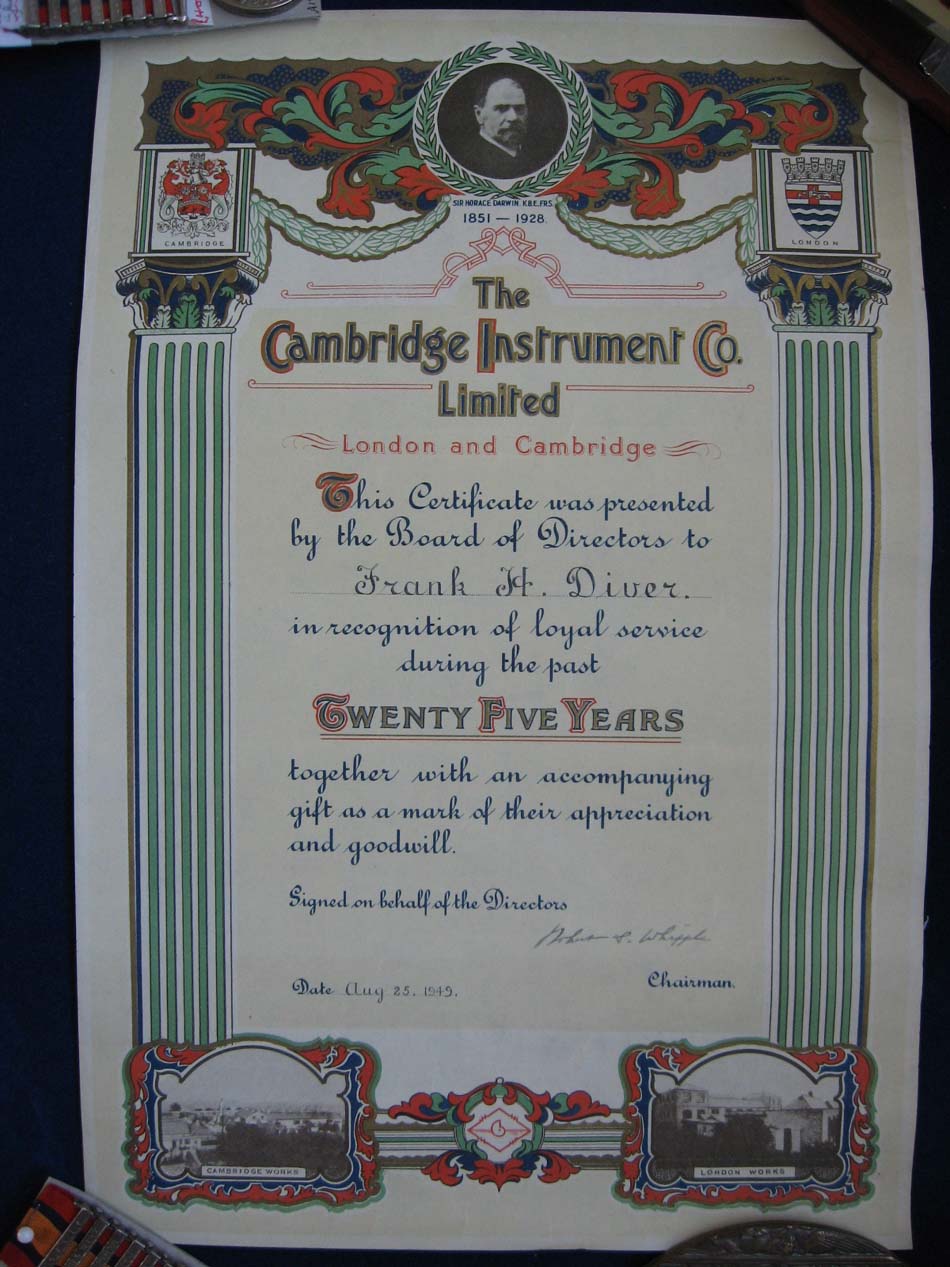
A picture of Sir Horace the founder of the Company is featured at the
head of the scroll.
Yet I digress, for an even more important influence entered Frank's
life in 1919. He married Amy Jane Beeton of Lynn House, Waterbeach on
the 18th June 1919. Amy Jane was a war widow. An excellent photograph
of Amy Jane and her 1st Husband [Richard Beeton] can be found on the
net. Go to http://www.roll-of-honour.com/Cambridgeshire/Waterbeach.html.
Frank's son Leslie Harold was born on 22nd April 1922 at Lynn House,
Waterbeach. By then the occupation of his Father was listed as Scientific
Instrument Maker. I have already suggested that Frank was intelligent
and willing to better himself. It seems to me that his new profession
amply fulfilled his instinctual urge to be creative.
Horace Darwin founded the Cambridge Scientific Instrument Company
in 1881. He was a renowned Engineer and played an important role in
the development of Aeronautics. He was knighted in 1918. Darwin gathered
several brilliant men around him. Including Robert Stewart Whipple,
whose signature is on Diver's Testimonial. Whipple donated a unique
collection of antique scientific instruments in 1944, to found the Whipple
Museum of the History of Science.
Frank's new job necessitated the family move to Cambridge. I have located
them at 41 Windsor Road in the 1942 Telephone Directory. Also on the
net, one can find a photograph of a "typical house on Windsor Road
Cambridge." Unfortunately this is number 45, built circa 1938.
Yet it illustrates their rising standard of living.
In the Second World War Frank became a Special Constable.
His medal and box of issue have survived. We learn his Specials number
was 122. Also we have a communication from the Cambridgeshire Constabulary
Chief Constable's Office dated 13 April 1946. It informs Diver, now
living at Cambridge Road, Waterbeach, that his claim for the Defence
Medal has been approved. The ribbon was enclosed. The Medal would be
forwarded later.
Frank died on the 31st December 1960 age 72 years, at Yapton, West Sussex.
His son Harold was present at the death. Frank's occupation was listed
as a Retired Instrument Maker. I fancy he was equally proud of that
as he was of his exceptional army career. One more subject needs to
be covered. Along with the medals and documents came a small black and
white photograph.
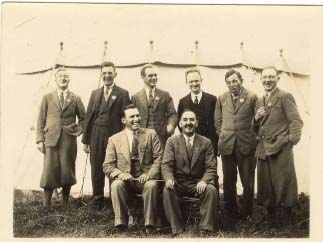
It shows a group of eight men and purports to be Special Constables
away at training camp, during the 2nd World War. Included in the group
is Frank Diver. The photograph is reproduced with this article.
Enquiries via Wellington Medals to the vendor of the Diver group have
unfortunately come to nothing. Can any reader in the Cambridge and especially
Waterbeach area identify Frank? Are there families with the surname
of Diver living in Waterbeach? Please contact me via the Editor of Medal
News. Hopefully we can then put a face to a name.
